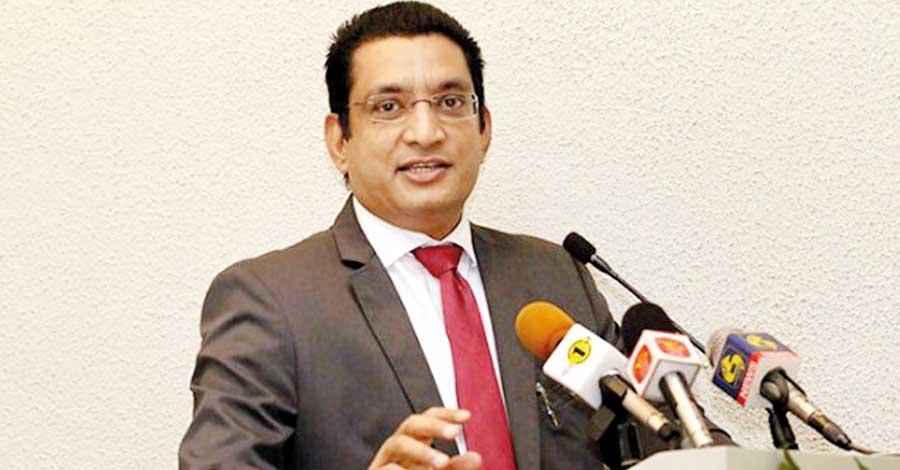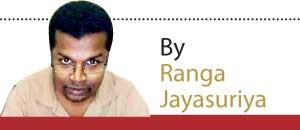Reply To:
Name - Reply Comment

If you follow, with a sense of detachment, what is happening in this country and the loudest of local reactions to these domestic and foreign developments, you cannot help but be amused.
but be amused.
Among the first things you would notice is that more than anyone else, Sri Lankans, a motley group, have done so much to undermine the country and relish it as a crowning achievement. That is not unique to one particular group, political party, ideology or ethnic or religious representation. (Though, I might run foul with political correctness if I observe a good deal of demographic uniformity in much of the most visceral voices.)
That being aside, this is, however, not unique to Sri Lanka itself. A cursory look at the polarizing discourse in much of the Indian subcontinent would reveal this as a South Asian proclivity. Consider the visceral opposition to the Modi government from the chattering classes in New Delhi and their NGO captains. In Pakistan, often misplaced scheming by the elected leaders to undermine each other had misfired, undermining the very state and democratic institutions, making it easier for the military to claw back power - and even making the average folks think the oversized military role is a necessary evil in the backdrop of pickle and selfish domestic politics.
One folk castigated Sabry for damaging the relations with one of Sri Lanka’s ‘oldest friends’, some others lectured on the diplomatic niceties, and many others indulged in usual invectives
Indian democracy has now been downgraded as a ‘partially free democracy’ by Freedom House or an ‘electoral autocracy’ by Sweden’s V Dem institute. And India ranks 161 out of 180 countries on the World Press Freedom Index. These are not year-end company financial reports. Abstract notions such as press freedom or democracy are not necessarily quantifiable. Anyone who tries that risks doing a sloppy job for what is presented as quantitative data, in this particular case is subjected to partisan interpretation and selective filtering. Often, the folks who do these reports live, work and have their work cross-fertilized by an eco-chamber of people. That incestual circle of ideological fellow travellers forms the back-and-forth feedback loops and shapes the outcome. If needed, one can also rely on a heavy dose of pent-up anger and disgruntlement in the social media of their ideological and political peers, who are better at communicating to foreigners in English than to their domestic audience in vernacular. So, you get a highly slanted one-sided narrative, which amplifies the negative side of the story through selective filtering and subjective interpretation.
Still, you could find, broadcast and reproduce a heavy dose of polarizing polemic because, the first place, you have freedom of expression. But the research work that relied on a slanted one-sided narrative hardly produces an objective outlook of the situation.
That is why, in the top 50 of the Press Freedom Index, you might find a large cohort of African states, where polemics of discourse is mitigated by law, institutional measures and organizational ethos of the media institutions. Journalism is founded on centuries of old traditions, value systems and a collective sense of responsibility passed down from generation to generation of journalists, which cannot be taught outside the newsroom nor can be quantified. It takes a healthy clash of ideas, a contest with the powers that be, a substantial outreach and a long existence for such institutional apparatus of journalism to emerge.
There is another reason: Who cares about democracy in a forbidden corner of Africa? It is not just the disgruntled locals who need to feel validated, their foreign peers themselves find validation by talking trash on countries that matter, which gives a sense of worth to their doo-gooding benefactors.
In Pakistan, often misplaced scheming by the elected leaders to undermine each other had misfired, undermining the very state and democratic institutions, making it easier for the military to claw back power - and even making the average folks think the oversized military role is a necessary evil in the backdrop of pickle and selfish domestic politics
Ali Sabry on Canada
Last week, the same circles fumed with self-righteous anger after Foreign Minister Ali Sabry slammed Canada in an interview with the news service, Asian News International. Sabry told ANI that ‘some terrorists have found haven in Canada’, echoing the Indian allegation that Canada is providing sanctuary to Khalistan secessionist forces, which, New Delhi alleges, are conspiring violence against India.
As much as putting Sri Lanka’s weight behind India not a bad foreign policy choice, even though it is more like an impromptus act, Sabry was tempted by the opportunity to settle scores over Canadian Prime Minister Justin Trudeau’s earlier statement on ‘The Tamil Genocide day’.
“…The Canadian PM has this way of just coming out with some outrageous allegations without any supporting proof. The same thing they did for Sri Lanka, a terrible, total lie about saying that Sri Lanka had a genocide. Everybody knows there was no genocide in our country,” Sabry said.
Now, the usual culprits are up in arms. One folk castigated Sabry for damaging the relations with one of Sri Lanka’s ‘oldest friends’, some others lectured on the diplomatic niceties, and many others indulged in usual invectives.
As much as putting Sri Lanka’s weight behind India not a bad foreign policy choice, even though it is more like an impromptus act, Sabry was tempted by the opportunity to settle scores over Canadian Prime Minister Justin Trudeau’s earlier statement on ‘The Tamil Genocide day
Diplomacy is reciprocal
Here is Diplomacy 101: Diplomacy is guided by the principle of reciprocity. Sauce for the goose is sauce for the gander. If it is good for the Canadian prime minister to commemorate a Tamil genocide day, even against the position of his own foreign ministry that events in Sri Lanka do not fall within the definition of genocide, so is it for Sabry to say what he meant. If that made Sri Lanka endeared for some circles in India, whose goodwill matters more than that of Canada, that is a bonus.
Disparities of relative power may prevent the weaker states from resorting to tit- for- tat, but this is not an act of war but a mere statement uttered on the sidelines of the
UN sessions.
Still, it could have mattered if Sri Lanka thought it was fitting to lecture the Japanese on their World War II history on behalf of the Chinese. Because relations with Japan matter. Whereas Sri Lanka’s relations with Canada are inconsequential, so are benefits for the country. Probably, opening two trade offices in Bangalore and Shenzhen would provide a better economic use case than maintaining a large diplomatic representation in Canada.
But, what is intriguing is the same folks who lament about ‘damaging’ relations with Canada are the type who habitually denigrate Sri Lanka’s relations with China; that is a country that matters for Sri Lanka’s future. Beijing is not just a time-tested ally, notwithstanding Mahinda Rajapaksa’s squandering of Chinese development assistance on a horde of vanity projects. It is also the most important development partner for Sri Lanka for decades to come unless India chooses to play an oversized economic role in Sri Lanka, which might need it to increase its current economic involvement by several folds and also hit beyond its relative economic heft vis a vis China in its relations with Sri Lanka.
However, Sri Lanka’s antiquated trade and investment laws are not conducive to the spillover of the most coveted sectors of the Indian economy, such as the Information sector, to its Southern neighbour.
But why do local jokers value relations with Canada more than our relations with India or China?
A subjective bias is at play, which one might argue is an inter-generational colonial hangover. (On the extreme opposite of these folks are the caveman- foreign policy- experts of Mahinda Rajapaksa). The usual outpour of pent-up disgruntlement with the government over matters both right and wrong is also a factor.
But there is another important psychological factor. This is one way these folks find a sense of self-validation within their eco-chambers, still better if some embassy big
shot spots it!
If you expand this thesis further, you might come across identical behaviour, be it the English Twitter chatter incriminating Ranil Wickremesinghe for talking back to the DW interviewer early this week or flaunting as received wisdom the Channel 4’s unsubstantiated single source documentary on the Easter Sunday attack.
Call this freedom of expression. But, the selective filtering, agenda setting and framing of the general discourse, when overwhelmingly dominated by one kind of folks, gives an exceedingly slanted view. That is true for India, and so is for Sri Lanka.
Follow @RangaJayasuriya on X